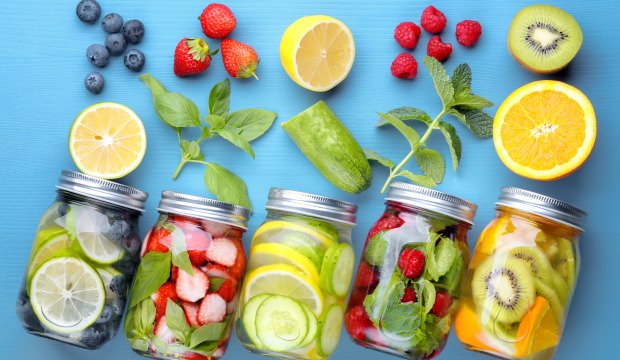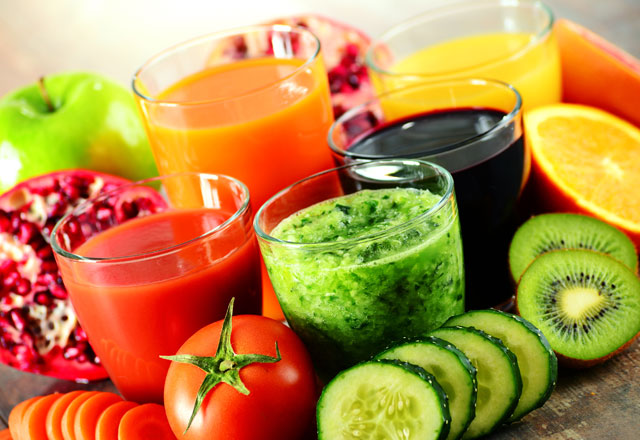This summer, juicing with liquid drinks and detoxing with a strict diet are very popular. The aim, of course, is to cleanse the metabolism of toxins. However, various weight loss programs, such as fat-burning juice cleanses, can do more harm than good to the metabolism. Especially during sudden weight loss, there may be a risk that toxins stored and stored in cellular fluids and various glands may circulate freely in the body. So what is a healthy detox?

Here is a nutrition-only section that will turn your detox into a wonderful process of renewal and revitalization:
- Drink plenty of clean and fresh water
Cause: One of the most important parts of the detox process is the elimination of toxins through urine and sweat. Keep in mind that excessive fluid loss will lead to more toxin loading in your body and let at least 1.5-2 liters of pure water (tea, coffee, fruit juice, etc. do not count) flow through your body to reach your goal.
Recommendation: Avoid consuming water stored in plastic bottles. Buy water in a glass bottle or choose to consume it from living water sources in forests. If you can’t do any of these, drink the water you fill from the plastic carboy at home to the glass jug and the glass or ceramic flask you use for drinking at work, after listening to pleasant melodious music (classical music, mantra music, nature sounds, etc.) and/or setting your intentions.
- Choose high-quality protein sources
Cause: Amino acids derived from protein are essential for enzymes and liver detoxification.
Recommendation: Choose plant-based protein sources such as black-eyed peas, dried beans, chickpeas, lentils, hazelnuts, walnuts, almonds, broad beans, kidney beans. Or poultry and eggs that you are sure are organic, and small, oily fish that are unlikely to contain mercury.
- Eat enough nutrients
Cause: Detoxification is a complex process. During this process, the body utilizes a range of vitamins, minerals and other nutrients.
Recommendation: Take vitamin B-complex, including methylcobalamin and methylfolate. Eat fresh, nutrient-dense fruits and vegetables that are brightly colored and vibrant.
- Prioritize cruciferous vegetables
Cause: Vegetables in this family support liver detox and estrogen exchange.
Recommendation: Eat broccoli, cauliflower, Brussels sprouts, cabbage, kale, dark colored greens. Always cook these vegetables lightly, not raw. This is because cruciferous vegetables contain effects that reduce the functioning of the thyroid hormone. In people with iodine deficiency, consuming cruciferous vegetables cooked will minimize this problem.
- Remember foods rich in antioxidants
Cause: During the multi-step detox process, our bodies can create damaging toxic metabolites if they are not barrier-built by protective nutrients.
Recommendation: Include vitamin C-rich food groups, magnesium and selenium supplements, as well as garlic, onions, fruits and dark and brightly colored vegetables, which contain powerful phytochemicals that are not only nutritious but also protect the body from disease. Artichokes, turmeric and coriander also contain silymarin. Silymarin is an antioxidant that supports liver detox and is most abundant in milk thistle.

What to avoid during detox
- Alcohol, tobacco, over-the-counter medicines and drugs.
- Caffeine. Although caffeine is metabolized by the liver, reducing your caffeine intake can really help the detox process. If you are used to consuming large amounts of caffeine on a daily basis, reduce it gradually to avoid symptoms such as headaches. If you are going to continue to drink coffee, try to drink less, preferring organic (not decaffeinated).
- Do not consume anything unnatural. Before you eat something, think “Did this food exist in nature 100 years ago?” and don’t eat it.
- Avoid processed, refined, genetically modified foods. Refuse any food item in a package that is not in its original form and do not buy it when shopping.
- Avoid processed sugar and all artificial sweeteners. Remember that natural sweeteners such as molasses, dates, honey, palm sugar, maple syrup, etc. can also be stressful to the liver due to their high fructose content if used in excess.
